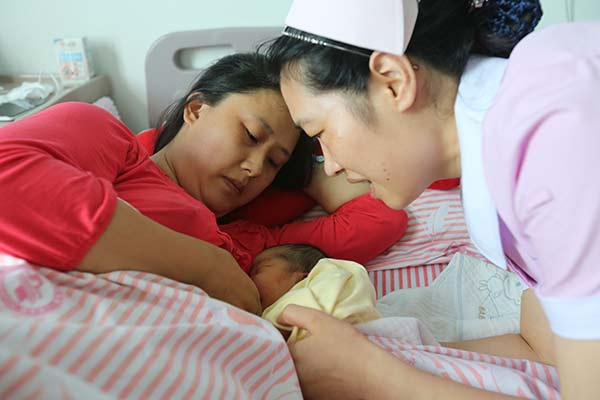 |
|
A nurse at a hospital in Xiangyang, Hubei province, helps Chen Jing to breast-feed her second child on Friday. GONG BO/CHINA DAILY |
Couples who want a second child after the announcement on Thursday that China's "one-child policy" is ending will have to wait until the appropriate laws are amended, according to experts.
The launch of the new policy needs to be in accordance with regional population and family planning laws, and the birth of a second child before such regulations are passed into law will be deemed illegal.
Jiang Weiping, director of the China Population and Development Research Center, said the necessary measures will be determined by people's congresses or their standing committees in provinces, autonomous regions and municipalities.
The people's congress at provincial level or its standing committee will revise local regulations or make new ones, with the support and guidance of the National Health and Family Planning Commission, Jiang said.
"The timeline for the operation of the new 'two-child policy' in different regions will determine when the second newborn baby will be able to have a legal identity," Jiang said.
Last year, several regions in China took the lead in introducing a second-child policy. However, parents in 17 provinces and autonomous regions who had a second child before the new local regulations were finalized still faced financial penalties.
After China relaxes its family planning policy, parents who choose to have one child or opt for a second child will no longer get government awards such as a monthly bonus, which varies in different regions.
"The number of new births will definitely increase in the coming years and we estimate that the peak will be over 20 million newborn babies," said Wang Pei'an, vice-minister of the National Health and Family Planning Commission.
At present, about 60 percent of China's child-bearing women are over 35 years old, which means an increase of 'elderly' mothers will be witnessed in China in the next few years, Wang said in a news release on Friday.
"It's safe to say that the two-child policy won't bring huge pressure on food security and basic public services, such as health, education and employment," Wang said. He estimated that another 30 million working people aged between 15 and 59 will be added by 2050. "It will benefit economic growth in the long term," Wang added.
Following a four-day meeting of the Communist Party of China Central Committee in Beijing this week, the central government announced that China will allow two children for every couple. For the present, only certain couples are eligible to have two children, such as those in which both partners are only children.
Timeline
1970: Chinese population exceeds 800 million.
1975: China adopts the slogan "Late, Long and Few" and encourages couples to have one child and urges them to have no more than two.
1980: A new marriage law says couples are obliged to practice family planning, placing a limit of one child for each family.
1984: China adjusts the policy, allowing a second child for some families in rural areas and for couples who both are an only child, and in some other specified circumstances.
2001: China decrees new laws to better manage the administration of the policy, including penalties for unapproved births. The laws allow local government to impose fines for additional children.
2013: China adds an exemption allowing two children for families in which one parent, rather than both, is an only child.
- NATIONAL HEALTH AND FAMILY PLANNING COMMISSION AND XINHUA NEWS AGENCY
